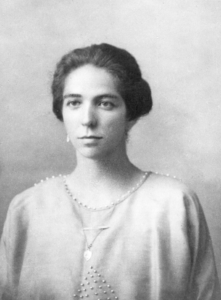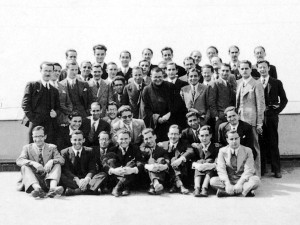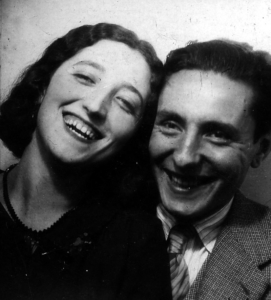A brief history of Opus Dei
Opus Dei was founded in Madrid on October 2, 1928, by Josemaría Escrivá de Balaguer, a 26-year-old priest from Aragon, Spain. Convinced that he had received a call from God, he began to spread a message of sanctity and apostolate in various parts of the Spanish capital within the context of ordinary Christian life: first, only among men; and from 1930, also among women.

María Ignacia García Escobar.
That ideal of the fullness of Christian life in the middle of the world gradually took root in a good number of people. Among the first were the railway engineer Isidoro Zorzano (1902-1943), a former fellow student of the founder, and a young woman from Cordoba, María Ignacia García Escobar (1896-1933). Later, other students and young professionals felt that God was calling them to seek holiness in Opus Dei. In this initial phase, St. Josemaría helped them to put this particular vocation into practice, through personal spiritual direction and meetings in small groups. With these means he carried out a wide-ranging program of evangelization and raising awareness among men and women of various ages and professions, although most of them were students. He also worked with a group of priests, whom he tried to instill with his ideals. It was from the notes of his spiritual life and the pastoral experience he gained in those first years that the book of spiritual aphorisms, The Way, was born. It was first published in 1939 and has been successively translated into more than fifty languages, with a circulation of about five million copies.
Three members of Opus Dei were ordained to the priesthood for the first time in 1944: Alvaro del Portillo (1914-1994), Jose Maria Hernandez Garnica (1913-1972) and Jose Luis Muzquiz (1912-1983). All three had worked until then as engineers. The number of priests in the Prelature of Opus Dei at present is about 2000. They always come from the lay faithful and enter the priesthood after having practiced a secular profession. They are mainly dedicated to the formative and apostolic work that Opus Dei carries out all over the world, while at the same time carrying out pastoral work and evangelization in educational and social projects, and at times also helping out in parishes and other diocesan tasks.
After the Second World War, Opus Dei extended to Europe and America and from the late 1950s also to Asia, Africa and Oceania. In many countries its members have launched educational and welfare initiatives with a positive social impact, such as the Centre Hospitalier Monkole in the Congo and the University of Asia and the Pacific in the Philippines.
The Priestly Society of the Holy Cross is inseparably linked to Opus Dei, through which the diocesan clergy can benefit from a specific spiritual assistance aimed at facilitating their search for holiness in the exercise of their priestly ministry.

St. Paul VI and St. Josemaría in 1965.
After the death of Josemaría Escrivá in 1975, Álvaro del Portillo (1914-1994), Javier Echevarría (1932-2016) and the current prelate, Fernando Ocáriz (1944), succeeded each other at the helm of Opus Dei.
Since 1982, Opus Dei has been a Personal Prelature, a structure created in the Catholic Church to carry out specific pastoral tasks. This is a result of the renewal of ecclesial structures brought about by the Second Vatican Council (1962-1965). The founder, before his death, had indicated it as the best juridical solution for Opus Dei.
At present, this prelature has some 90,000 faithful who belong to all strata of society, mainly the middle and lower-middle classes. Most of them are married people. The headquarters are in Rome (Viale Bruno Buozzi 75). The prelatic church of Santa Maria della Pace is also located there. The remains of the founder, who was canonized by John Paul II in October 2002, repose in this church.
Further information may be obtained at www.opusdei.org.
Timeline
1928. October 2: Josemaría Escrivá sees clearly that God is calling him to spread the ideal of sanctification through professional work and the fulfillment of the ordinary duties of a Christian. In his notes and conversations he speaks of “the Work of God”. Later he will translate it into Latin as “Opus Dei”, and this will be the name of the institution to which he will dedicate his life.
1930. February 14: In Madrid, while celebrating Holy Mass, St. Josemaría understands that God also wants women to become part of Opus Dei.
1933. In a small flat in Madrid, the first institutional activity of Opus Dei begins, the DYA Academy, where classes are given in law and architecture. There, St. Josemaría carries out an intense apostolate with students and young professionals through spiritual direction, talks, study circles, etc.
1934. DYA is converted into a university residence. It is from here that the founder and the first members offer Christian formation and spread the message of Opus Dei mainly among university students, although young professionals also benefit. Part of this work is catechesis and care for the poor and sick in the poorest neighborhoods on the outskirts of Madrid.
message of Opus Dei mainly among university students, although young professionals also benefit. Part of this work is catechesis and care for the poor and sick in the poorest neighborhoods on the outskirts of Madrid.
Spiritual Considerations, the forerunner of The Way, is published in Cuenca.
1936. Spanish Civil War: religious persecution is unleashed. St. Josemaría and the members of Opus Dei who have remained in the Republican zone fear for their lives and are forced to take refuge in various places or to lead a clandestine lifestyle. The circumstances make it necessary to temporarily suspend the founder’s plans to extend the apostolic work of Opus Dei to Valencia and Paris.
1937. The founder and some members of Opus Dei travel across the Pyrenees in Andorra to the nationalist area, where the Church is not persecuted.
1938. The apostolic activity resumes in Burgos.
1939. Josemaría Escrivá returns to Madrid. The history of Opus Dei’s expansion to other cities in Spain begins. The outbreak of the Second World War prevents the expansion of Opus Dei to other countries.
1941. 19 March: the bishop of Madrid, Msgr. Leopoldo Eijo y Garay, grants the first diocesan approval of Opus Dei.
1943. February 14: During Mass, St. Josemaría sees a juridical solution that will allow the ordination of priests in Opus Dei. He has no doubt that this is also a supernatural suggestion.
1944. 25 June: The bishop of Madrid ordains three faithful of Opus Dei to the priesthood: Álvaro del Portillo, José María Hernández de Garnica and José Luis Múzquiz.
1945. The expansion of Opus Dei commences in Europe and America.
1946. The founder of Opus Dei moves to Rome. In the following years he travels from the Eternal City to prepare for the establishment of the activities of Opus Dei in various countries. The first assistant numerary, Dora del Hoyo (1914-2004), asks to be admitted to Opus Dei, living out a vocation that fosters sanctification through a spirit of service, especially in the work of the home.

Tomás and Paquita Alvira were some of the first supernumeraries of Opus Dei.
1947. 24 February: the Holy See grants the first pontifical approval. The first three married members ask to be admitted.
1948. 29 June: The Founder sets up the Roman College of the Holy Cross, where many of the numerary members of Opus Dei will go to receive spiritual, theological and apostolic formation while studying in the various Roman Pontifical Universities. St. Josemaría obtains the Holy See’s approval for married people to form part of Opus Dei, not only in practice but also by right. The first study week for those who wish to live this vocation by sanctifying themselves in the married state takes place in Molinoviejo, Segovia. In time, the “supernumeraries” as they will be called will become the largest group of members.
1950. 16 June: Pius XII grants definitive approval to Opus Dei. This step confirms that people who are married or living celibacy without living in an Opus Dei center, later known as “associates”, can be admitted to Opus Dei. The first associate asks to be admitted. The Priestly Society of the Holy Cross is also set up. This allows priests incardinated in different dioceses to benefit from the spirit of Opus Dei and its spiritual care in helping them to carry out their ecclesial task at the service of the Church, while depending on their own bishop.
1952. Establishment in Pamplona (Spain) of the Estudio General de Navarra, which will later become the University of Navarre.
1953. 12 December: The Roman College of Holy Mary is established. This is a center dedicated to providing spiritual, theological and apostolic formation for women in Opus Dei from all over the world.
1957. The Holy See entrusts the Prelature of Yauyos in Peru to Opus Dei.
1958. The expansion of Opus Dei in Asia and Africa commences.
1963. Opus Dei begins in Australia.
1965. 21 November: Paul VI officially opens the Elis Centre, a social initiative dedicated to the professional formation of young people. The Center is located on the outskirts of Rome and has a parish attached which is entrusted to Opus Dei.
1970. The founder of Opus Dei travels to Mexico. He goes to the Shrine of Our Lady of Guadalupe to pray for a period of nine days. He holds several large meetings where he carries out effective Christian catechesis.
1972. St. Josemaría travels through Spain and Portugal on a two-month catechetical trip.
1974. The founder of Opus Dei makes a catechetical trip to six countries in South America: Brazil, Argentina, Chile, Peru, Ecuador and Venezuela.
1975. Catechetical trip of the founder of Opus Dei to Venezuela and Guatemala.
26 June: Saint Josemaría dies in Rome.
September 15: Msgr. Alvaro del Portillo is chosen to succeed the founder of Opus Dei.
1982. 28 November: Pope John Paul II establishes Opus Dei as a personal prelature, a juridical structure in keeping with its theological and pastoral nature. The Holy Father appoints Msgr. Alvaro del Portillo as Prelate.
1983. 19 March: Formal execution of the Papal Bull establishing Opus Dei as a personal prelature.
1985. The Roman Academic Centre of the Holy Cross is founded in Rome which in 1998 will become the Pontifical University of the Holy Cross.
1991. 6 January: John Paul II ordains Msgr. Álvaro del Portillo, Prelate of Opus Dei, as a bishop.
The Centre Hospitalier Monkole is launched in Kinshasa.
1992. May 17: Beatification of Josemaría Escrivá in St. Peter’s Square, Rome
1994. 23 March: Msgr. Alvaro del Portillo dies in Rome a few hours after returning from a pilgrimage to the Holy Land.
20 April: John Paul II appoints Msgr. Javier Echevarría as Prelate of Opus Dei, confirming the election made at the General Elective Congress held in Rome.
2001. The Prelate of Opus Dei establishes the Josemaría Escrivá Historical Institute, with its headquarters in Rome.
2002. October 6: Pope John Paul II canonizes Josemaría Escrivá in St. Peter’s Square (Rome)
2014. 27 September: Álvaro del Portillo is beatified in Madrid.
2016. 12 December: Msgr. Javier Echevarría dies in Rome.
2017. January 23rd: Msgr. Fernando Ocáriz is elected Prelate of Opus Dei. He receives the corresponding appointment from Pope Francis.
2019. 18 May: beatification, in Madrid, of Guadalupe Ortiz de Landázuri (1916-1975). She is the first lay member of Opus Dei to be raised to the altars.
Date of the commencement of Opus Dei’s apostolic activity in various countries
1945 Portugal
1946 Italy and United Kingdom
1947 France and Ireland
1949 Mexico and United States of America
1950 Chile and Argentina
1951 Colombia and Venezuela
1952 Germany
1953 Guatemala and Peru
1954 Ecuador
1956 Uruguay and Switzerland
1957 Brazil, Austria and Canada
1958 Japan, Kenya and El Salvador
1959 Costa Rica
1960 The Netherlands
1962 Paraguay
1963 Australia
1964 Philippines
1965 Belgium and Nigeria
1969 Puerto Rico
1978 Bolivia
1980 Congo, Ivory Coast and Honduras
1981 Hong-Kong
1982 Singapore and Trinidad-Tobago
1984 Sweden
1985 Taiwan
1987 Finland
1988 Cameroon and Dominican Republic
1989 Macao, New Zealand and Poland
1992 Nicaragua, Hungary and Czech Republic
1993 India and Israel
1994 Lithuania
1996 Estonia, Slovakia, Lebanon, Panama and Uganda
1997 Kazakhstan
1998 South Africa
2003 Slovenia and Croatia
2004 Latvia
2007 Russia
2009 Korea, Romania and Indonesia
2011 Sri Lanka
